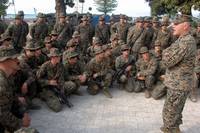
By Michel Chossudovsky
URL of this article: www.globalresearch.ca/index.php?context=va&aid=18118
Global Research, March 28, 2010

A recent report in Stars and Stripes reveals the nature of the US military operation in Haiti. Combat units from Iraq and Afghanistan have been deployed in Haiti under the banner of a humanitarian operation. Conversely, Haiti is also being used as a military training ground for forces without in-theater combat experience.
According to the Stars and Stripes report (March 14, 2010): "Marines deployed to Haiti to render emergency aid following January’s devastating earthquake are already training for the fight in Afghanistan."
Marines from the 22nd Marine Expeditionary Unit who were dispatched to Haiti in the immediate wake of the earthquake are now being deployed in Afghanistan. In fact, the decision to send them to Afghanistan was taken prior to their deployment in Haiti:
"A small group of Marines stormed several small concrete buildings inside the wire at their seashore camp while their comrades played the roles of Afghan insurgents, shouting “bang” as they engaged their opponents in a mock attack. The day before, when Lt Gen Dennis J. Hejlik, commanding general of the II Marine Expeditionary Force visited the Marines on shore, he praised their good work in Haiti and asked them, “What’s next for you when you get home?”
“Afghanistan,” came the reply. As Huey helicopters buzzed overhead,
Hejlik talked about the recent Marjah offensive, adding that there would be
20,000 Marines in Afghanistan by summer. “You will join them next spring,”
he told the Marines at Carrefour. One of them, Sgt. Timothy Kelly, 23, of Johnston
City, Ill., said members of his unit learned about the Afghan mission just before
they got orders to head for Haiti."
The training in Haiti "is geared towards close-quarters battle tactics":
“Only a couple [of Marines in Kelly’s squad] have experience in Iraq or Afghanistan,” he said. ...
We have a lot of guys that aren’t going to be here for that Afghan deployment. The ones who are, we might as well get them in the mind-set.
Another Marine at Carrefour, Lance Cpl. Keith Cobb, 23, of Soso, Miss., said the Afghan deployment will be his first time in a war zone. “I want to kill the terrorists and get rid of the bad people, but I would rather be here because I know I’m going home after this,” he said”
Close Quarters Battle (CQB) is fighting involving small combat units "which engage the enemy with personal weapons at very short range". The training imparted in Haiti is to be used in both urban warfare and counterinsurgency operations.
On March 25th, the US military reported that some 2,200 Marines, involved in humanitarian relief in Haiti had been withdrawn from the country.
The Role of The Canadian Military
The Canadian military has adopted a similar pattern. Haiti is used as a launchpad for redeploying combat troops to the Middle East war theater.
Canadian troops initially dispatched to Haiti under a humanitarian mandate are being sent to Afghanistan: "Soldiers of the Royal 22nd Regiment will have only two weeks before they have to switch their focus from providing emergency relief in Haiti to intensive combat training for a tour in Afghanistan, the commander of all Canadian troops overseas says." ( National Post, February 23, 2010). The training of Canadian forces in Haiti, however, is to be imparted in Canada, prior to their redeployment.
Michel Chossudovsky is Professor of Economics (Emeritus) at the University
of Ottawa and Director of the Centre for Research on Globalization (CRG), Montreal,
which hosts the award-winning website: www.globalresearch.ca. He is the author
of the international best-seller The Globalisation of Poverty and The New World
Order and contributor to the Encyclopaedia Britannica. He is member of the Kuala
Lumpur War Crimes Commission and recipient of the Human Rights Prize of the
Society for the Protection of Civil Rights and Human Dignity (GBM), Berlin,
Germany. He has acted as an adviser to the governments of developing countries
and has worked as a consultant for several inter-governmental organizations
including the UNDP, the ILO, the UNFPA, the WHO and the African Development
Bank. His writings have been published into more than twenty languages.